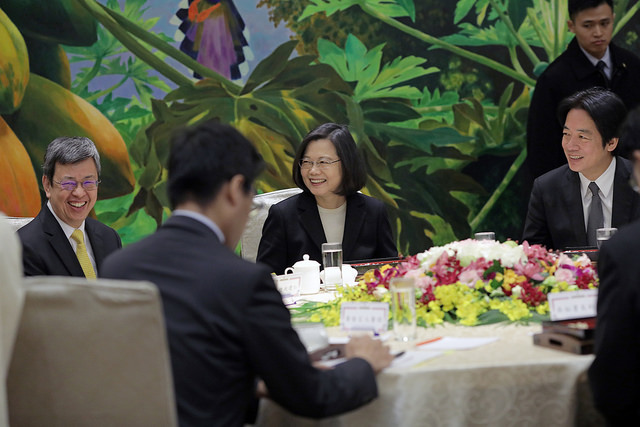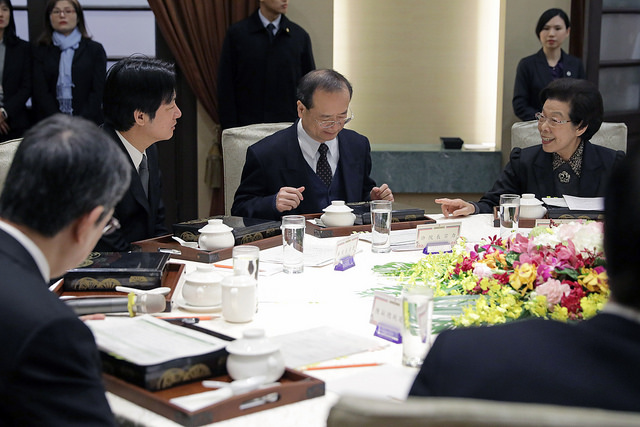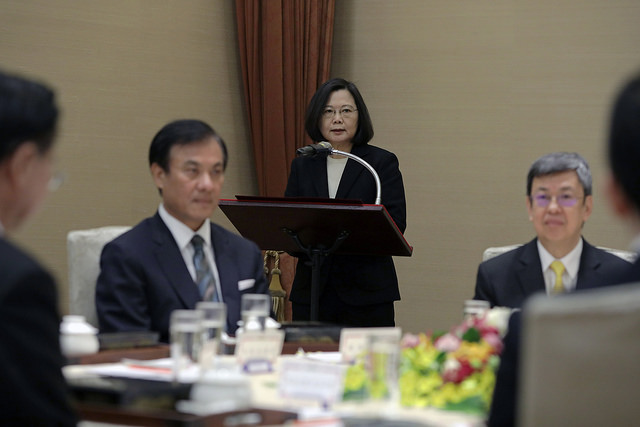News & activities
 News releases
News releases
Around noon on January 11, President Tsai Ing-wen hosted a luncheon meeting with the heads of the five Yuan (i.e. the five branches of Taiwan's government) where she emphasized that the government is a single, unified entity, and should meet the people's expectations as effectively as possible. She also said that the five Yuan should cooperate, and respect each other's scope of authority so the government can operate smoothly.
In her opening remarks, the president said she was happy to invite the heads of the five Yuan to the Office of the President, and that these informal discussions are a long-standing tradition. She also took the opportunity to thank the attendees for their efforts, and urged them to exchange views so that government affairs will be promoted more smoothly.
President Tsai pointed out that although Taiwan's constitutional system defines the separate duties and functions of the five Yuan, many issues also require coordination and cooperation. Although each Yuan has different functions, they should mesh like the gears of a well-oiled machine, she said. So they need more opportunities to communicate and keep things running smoothly, and she hoped everyone would make the most of those opportunities.
President Tsai said that people in Taiwan know how cooperation and oversight function in the Executive Yuan-Legislative Yuan relationship. To approve funding to implement major policies or pass laws that will transform Taiwan's future, the Executive Yuan needs the Legislative Yuan's oversight and support.
The president noted that many issues require coordination and cooperation between the Judicial Yuan, Examination Yuan, and Control Yuan. Issues of great public concern like judicial reform are a good example. The National Conference on Judicial Reform produced many suggestions and points of consensus, including reform proposals from the Judicial Yuan and the Executive Yuan's Ministry of Justice that must be passed by the Legislative Yuan.
The president pointed out that reforms in testing and hiring judicial officials also require joint planning with the Examination Yuan, and that oversight of such officials has always been an important task for the Control Yuan. Coordination and cooperation among the five Yuan is thus essential to implementing reforms.
President Tsai also gave the heads of the five Yuan some encouragement, and said the people of Taiwan see the government as a single, unified entity, not as separate agencies or for any political party's interest. So the government should meet the people's expectations as effectively as possible. This is the government's obligation. She also said the five Yuan should cooperate, and respect each other's scope of authority so the government can operate smoothly. She then asked the heads of the five Yuan to speak freely at the meeting, and cite issues where coordination is needed. The only way to meet the public's expectations, she said, is for everyone to work together and get the job done.
The heads of the five Yuan at the luncheon were Premier Lai Ching-te (賴清德), Legislative Yuan President Su Jia-chyuan (蘇嘉全), Judicial Yuan President Hsu Tzong-li (許宗力), Examination Yuan President Wu Jin-lin (伍錦霖), and Control Yuan President Chang Po-ya (張博雅). Also attending were ROC Vice President Chen Chien-jen, Secretary-General to the President Joseph Wu (吳釗燮), and Deputy Secretary-General to the President Liu Chien-sin (劉建忻).





